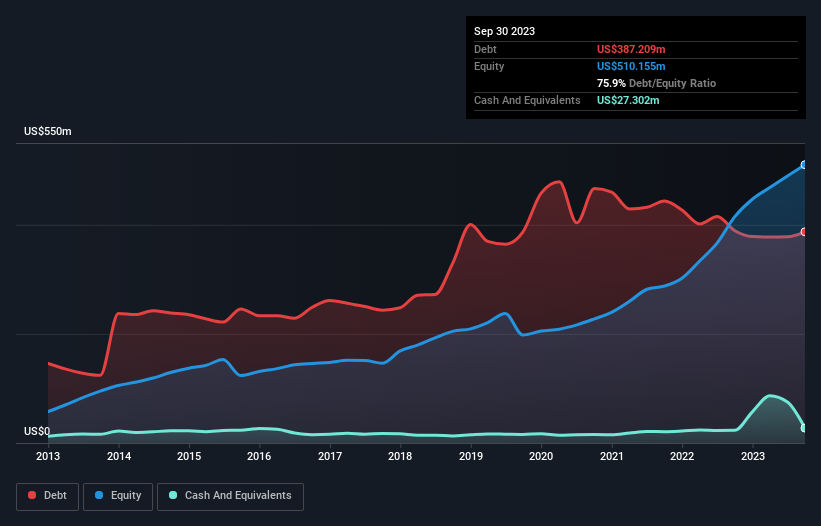- United States
- /
- Transportation
- /
- NasdaqGS:ULH
Here's Why Universal Logistics Holdings (NASDAQ:ULH) Has A Meaningful Debt Burden

Warren Buffett famously said, 'Volatility is far from synonymous with risk.' So it might be obvious that you need to consider debt, when you think about how risky any given stock is, because too much debt can sink a company. Importantly, Universal Logistics Holdings, Inc. (NASDAQ:ULH) does carry debt. But should shareholders be worried about its use of debt?
Why Does Debt Bring Risk?
Generally speaking, debt only becomes a real problem when a company can't easily pay it off, either by raising capital or with its own cash flow. If things get really bad, the lenders can take control of the business. While that is not too common, we often do see indebted companies permanently diluting shareholders because lenders force them to raise capital at a distressed price. By replacing dilution, though, debt can be an extremely good tool for businesses that need capital to invest in growth at high rates of return. The first thing to do when considering how much debt a business uses is to look at its cash and debt together.
Check out our latest analysis for Universal Logistics Holdings
What Is Universal Logistics Holdings's Debt?
The chart below, which you can click on for greater detail, shows that Universal Logistics Holdings had US$387.2m in debt in September 2023; about the same as the year before. However, because it has a cash reserve of US$27.3m, its net debt is less, at about US$359.9m.

How Strong Is Universal Logistics Holdings' Balance Sheet?
We can see from the most recent balance sheet that Universal Logistics Holdings had liabilities of US$286.9m falling due within a year, and liabilities of US$462.2m due beyond that. Offsetting these obligations, it had cash of US$27.3m as well as receivables valued at US$335.5m due within 12 months. So its liabilities outweigh the sum of its cash and (near-term) receivables by US$386.4m.
Universal Logistics Holdings has a market capitalization of US$689.7m, so it could very likely raise cash to ameliorate its balance sheet, if the need arose. However, it is still worthwhile taking a close look at its ability to pay off debt.
We use two main ratios to inform us about debt levels relative to earnings. The first is net debt divided by earnings before interest, tax, depreciation, and amortization (EBITDA), while the second is how many times its earnings before interest and tax (EBIT) covers its interest expense (or its interest cover, for short). The advantage of this approach is that we take into account both the absolute quantum of debt (with net debt to EBITDA) and the actual interest expenses associated with that debt (with its interest cover ratio).
With net debt sitting at just 1.5 times EBITDA, Universal Logistics Holdings is arguably pretty conservatively geared. And this view is supported by the solid interest coverage, with EBIT coming in at 7.3 times the interest expense over the last year. In fact Universal Logistics Holdings's saving grace is its low debt levels, because its EBIT has tanked 26% in the last twelve months. When it comes to paying off debt, falling earnings are no more useful than sugary sodas are for your health. The balance sheet is clearly the area to focus on when you are analysing debt. But ultimately the future profitability of the business will decide if Universal Logistics Holdings can strengthen its balance sheet over time. So if you want to see what the professionals think, you might find this free report on analyst profit forecasts to be interesting.
Finally, while the tax-man may adore accounting profits, lenders only accept cold hard cash. So the logical step is to look at the proportion of that EBIT that is matched by actual free cash flow. In the last three years, Universal Logistics Holdings's free cash flow amounted to 23% of its EBIT, less than we'd expect. That weak cash conversion makes it more difficult to handle indebtedness.
Our View
We'd go so far as to say Universal Logistics Holdings's EBIT growth rate was disappointing. But on the bright side, its interest cover is a good sign, and makes us more optimistic. Once we consider all the factors above, together, it seems to us that Universal Logistics Holdings's debt is making it a bit risky. Some people like that sort of risk, but we're mindful of the potential pitfalls, so we'd probably prefer it carry less debt. There's no doubt that we learn most about debt from the balance sheet. However, not all investment risk resides within the balance sheet - far from it. Be aware that Universal Logistics Holdings is showing 1 warning sign in our investment analysis , you should know about...
At the end of the day, it's often better to focus on companies that are free from net debt. You can access our special list of such companies (all with a track record of profit growth). It's free.
New: AI Stock Screener & Alerts
Our new AI Stock Screener scans the market every day to uncover opportunities.
• Dividend Powerhouses (3%+ Yield)
• Undervalued Small Caps with Insider Buying
• High growth Tech and AI Companies
Or build your own from over 50 metrics.
Have feedback on this article? Concerned about the content? Get in touch with us directly. Alternatively, email editorial-team (at) simplywallst.com.
This article by Simply Wall St is general in nature. We provide commentary based on historical data and analyst forecasts only using an unbiased methodology and our articles are not intended to be financial advice. It does not constitute a recommendation to buy or sell any stock, and does not take account of your objectives, or your financial situation. We aim to bring you long-term focused analysis driven by fundamental data. Note that our analysis may not factor in the latest price-sensitive company announcements or qualitative material. Simply Wall St has no position in any stocks mentioned.
About NasdaqGS:ULH
Universal Logistics Holdings
Provides customized transportation and logistics solutions in the United States, Mexico, Canada, and Colombia.
Undervalued with mediocre balance sheet.
Market Insights
Community Narratives


